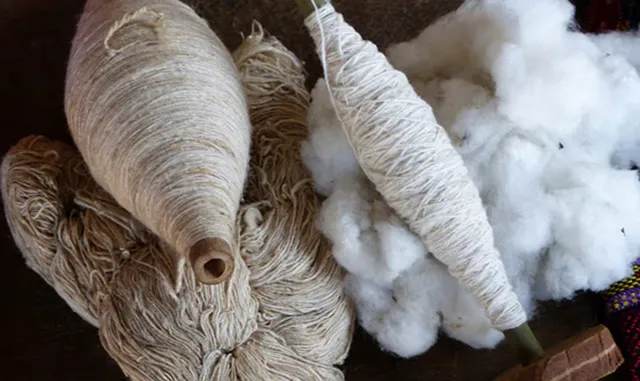- Courses
- GS Full Course 1 Year
- GS Full Course 2 Year
- GS Full Course 3 Year
- GS Full Course Till Selection
- Online Program
- GS Recorded Course
- NCERT (Recorded 500+ Hours)
- Polity Recorded Course
- Geography Recorded Course
- Economy Recorded Course
- AMAC Recorded Course
- Modern India, Post Independence & World History
- Environment Recoded Course
- Governance Recoded Course
- Science & Tech. Recoded Course
- International Relations and Internal Security Recorded Course
- Disaster Management Module Course
- Ethics Recoded Course
- Essay Recoded Course
- Current Affairs Recoded Course
- CSAT
- 5 LAYERED ARJUNA Mentorship
- Public Administration Optional
- ABOUT US
- OUR TOPPERS
- TEST SERIES
- FREE STUDY MATERIAL
- VIDEOS
- CONTACT US
NEHHDC Achieves Oeko-Tex Certification for Eri Silk
NEHHDC Achieves Oeko-Tex Certification for Eri Silk

On August 15, 2024, the North Eastern Handicrafts and Handlooms Development Corporation (NEHHDC), operating under the Ministry of Development of North Eastern Region (DoNER), Government of India, attained the esteemed Oeko-Tex certification for its Eri Silk.
- This significant achievement, announced on India’s 78th Independence Day, not only highlights the traditional craftsmanship of the Northeast but also establishes Eri Silk as a globally recognized, sustainable textile.
About Eri Silk
- Unique Characteristics:
- Eri Silk is distinguished as the world’s only vegan silk. Unlike other silks, which require killing the moth inside the cocoon, Eri Silk allows the moth to naturally exit the cocoon. This ethical method of production makes Eri Silk a symbol of compassion and sustainability in the textile industry.
- Production and Distribution:
- Produced by the domesticated silkworm Philosamia ricini, which primarily feeds on castor leaves, Eri Silk is predominantly cultivated in the northeastern states of India, including Assam.
- It is also found in Bihar, West Bengal, and Orissa.
- Eri Silk is recognized as a Geographical Indication (GI) product from Assam, emphasizing its regional significance and authenticity.
Significance of Oeko-Tex Certification
- Certification Standards:
- The Oeko-Tex certification represents a rigorous standard ensuring that textiles are tested for harmful substances and produced under environmentally friendly conditions. This endorsement is crucial for establishing Eri Silk’s credentials as a sustainable and safe product in the global market.
- Impact on Global Market:
- The certification is a step in expanding Eri Silk's presence in the global export market. It enhances the silk’s international appeal and positions it as a leading eco-friendly fabric.
- Commitment to Heritage and Sustainability:
- This accomplishment underscores NEHHDC’s dedication to promoting and preserving the rich cultural heritage of Assam while aligning with global sustainability practices.
What is Geographical Indication (GI) Tag?Geographical Indications (GI tags) in India are signs used to denote products that originate from a specific geographical location and possess qualities, reputation, or characteristics linked to that origin.
International Conventions on GI Tags
GI Tag in India
State-Wise GI Tag Products in India
|
The Various States' GI tags are as Follows:
|
State |
GI Tags |
|
Andhra Pradesh |
Handicraft: Srikalahasti Kalamkari, Kondapalli Bommallu, Budithi Bell and Brass Metal Craft, Uppada Jamdani Sarees, Bobbili Veena, Durgi Stone Carvings, Etikoppaka Toys. Food Stuff: Tirupati Laddu, Bandar Laddu Agricultural: Guntur Sannam Chilli, Banaganapalle Mangoes. |
|
Arunachal Pradesh |
Handicraft: Idu Mishmi Textiles Agricultural: Khaw Tai (Khamti Rice), Yak Churpi |
|
Assam |
Handicraft: Muga Silk Manufactured: Judima |
|
Bihar |
Handicraft: Madhubani Paintings, Sujini Embroidery Manufactured: Bhagalpuri Zardalu, Katarni Rice Food Stuff: Silao Khaja |
|
Chattisgarh |
Handicraft: Bastar Dhokra, Champa Silk Saree and Fabrics |
|
Goa |
Manufactured: Feni Agricultural: Khola Chilli |
|
Gujarat |
Handicraft: Sankheda Furniture, Tangaliya Shawl, Jamnagari Bandhani, Mata ni Pachhedi Agricultural: Bhalia Wheat |
|
Himachal Pradesh |
Handicraft: Kullu Shawl Agricultural: Kangra Tea |
|
Jharkhand |
Handicraft: Sohrai – Khovar Painting. |
|
Karnataka |
Handicraft: Mysore Silk, Kasuti Embroidery, Molakalmuru Sarees Handicraft, Sandur Lambani Embroidery, Kinhal Toys, Kolhapuri Chappal Manufactured: Mysore Sandal Soap, Mysore Agarbathi Agricultural: Coorg Orange, Coorg Green Cardamom, Devanahalli Pomello, Appemidi Mango, Byadagi Chilli, Indi Limbe, Monsooned Malabar Robusta Coffee, Monsooned Malabar Arabica Coffee |
|
Kerala |
Handicraft: Aranmula Kannadi, Alleppey Coil. Agricultural: Navara Rice, Pokkali Rice, Kaipad Rice, Chengalikodan Nendran Banana, Nilambur Teak, Tirur Betel Leaf (Tirur Vettila), Attappady Thuvara |
|
Madhya Pradesh |
Handicraft: Chanderi Sarees, Maheshwar Sarees and Fabrics Agricultural: Sharbati Gehu Food Stuff: Jhabua Kadaknath Black Chicken Meat, Ratlami Sev |
|
Maharashtra |
Agricultural: Nashik Grapes, Ajara Ghansal Rice, Mangalwedha Jowar, Navapur Tur Dal, Lasalgaon Onion, Sangli Raisins, Ambemohar Rice, Alphonso Handicraft: Kolhapuri Chappal |
|
Manipur |
Handicraft: Shaphee Lanphee, Wangkhei Phee |
|
Mizoram |
Handicraft: Pawndum, Tawlhlohpuan |
|
Odisha |
Handicraft: Konark Stone Carving, Khandua Saree and Fabrics, Gopalpur Tussar Fabrics, Dungaria Kondh Embroidered Shawl Agricultural: Kandhamal Haladi, Koraput Kalajeera Rice |
|
Rajasthan |
Handicraft: Thewa Art Work, Molela Clay Work, Sanganeri Hand Block Printing, Bagru Hand Block Print, Pokaran Pottery. Natural: Makrana Marble |
|
Tamilnadu |
Handicraft: Salem Fabric, Kancheepuram Silk, Madurai Sungudi, Thanjavur Paintings, Salem Silk (Salem Venpattu), Kovai Kora Cotton Sarees, Arani Silk, Pattamadai Pai (Pattamadai Mat), Toda Embroidery, Mahabalipuram Stone Sculpture, Thirubuvanam Silk Sarees, Dindigul Locks, Kandangi Sarees. Manufactured: East India Leather. Agricultural: Madurai Malli, Erode Manjal (Erode Turmeric). Food Stuff: Kovilpatti Kadalai Mittai, Salem Sago. Natural: Marthandam Honey. |
|
Telangana |
Handicraft: Pochampalli Ikat, Nirmal Toys and Craft, Gadwal Sarees, Cheriyal Paintings, Pembarthi Metal Craft, Adilabad Dokra, Telia Rumal |
|
Uttar Pradesh |
Handicraft: Khurja Pottery, Mahoba Gaura Patthar Hastashlip, Mainpuri Tarkashi, Sambhal Horn Craft Agricultural: Mango Malihabadi Dusseheri, Kalanamak Rice. |
|
West Bengal |
Handicraft: Nakshi Kantha, Baluchari Saree, Dhaniakhali Saree, Purulia Chau Mask Agricultural: Darjeeling Tea, Tulapanji Rice, Gobindobhog Rice Food Stuff: Joynagar Moa, Bardhaman Sitabhog. |
|
Union Territory |
GI Tags |
|
Jammu and Kashmir |
Handicraft: Kani Shawl, Agricultural: Ramban Sulai Honey, Mushqbudji Rice, Bhaderwah Rajmash, Kashmir Saffron |
|
Pondicherry |
Handicraft: Villianur Terracotta Works, Tirukanur Papier Mache Craft |
|
Ladakh |
Handicraft: Pashmina Wool Agricultural: Ladakh Raktsey Karpo Apricot |
|
Joint GI Tag Products of States |
|
|
|
Conclusion:
The Oeko-Tex certification for Eri Silk represents a landmark achievement for NEHHDC and the Northeast region. It not only highlights the ethical and sustainable nature of Eri Silk but also sets the stage for its increased global recognition and market expansion. This milestone reinforces the commitment to preserving traditional craftsmanship while embracing modern standards of sustainability and environmental responsibility.
Must Check: Best IAS Coaching In Delhi
UPSC Prelims Result 2024 Out: Expected Cut Off & Other Details, UPSC Prelims 2024 Answer with Explanation, Daily Prelims Quiz, Daily Current Affairs, MONTHLY CURRENT AFFAIRS TOTAL (CAT) MAGAZINE, Best IAS Coaching Institute in Karol Bagh, Best IAS Coaching Institute in Delhi, Daily Mains Question Answer Practice, ENSURE IAS UPSC Toppers, UPSC Toppers Marksheet, Previous Year Interview Questions, UPSC Syllabus




